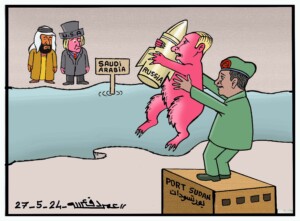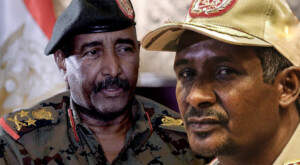El Burhan criticises Sudan’s Sovereign Council, defends TPC
In a speech yesterday, Chairman of Sudan’s Sovereign Council Lt Gen Abdelfattah El Burhan accused the Sovereign Council of failure and defended his decision to establish the Transitional Partners Council (TPC).
 Lt Gen Abdelfattah El Burhan addresses military recruits in Shakout, north of the capital (social media)
Lt Gen Abdelfattah El Burhan addresses military recruits in Shakout, north of the capital (social media)
In a speech yesterday, Chairman of Sudan’s Sovereign Council Lt Gen Abdelfattah El Burhan accused the Sovereign Council of failure and defended his decision to establish the Transitional Partners Council (TPC).
"A year after its creation, I say that the transitional council has failed to respond to the aspirations of the people and of the revolution," El Burhan said, addressing military trainees from the ‘Descendants of Taharqa 4’ at the end of their training year at Shakout military area north of Khartoum with the participation of units of the 5th Infantry Brigade, Air Force, Air Defense and Rapid Support Forces.
El Burhan emphasised the inability of the government to achieve the aspirations of the people and the revolution despite the fact that is has been more than a year since the Sovereign Council and the Council of Ministers were formed. He pointed out the increased suffering of people to obtain their daily needs.
He stressed that the formation of the Transitional Partners Council was done in agreement with the Forces of Freedom and Change and that its functions and powers were approved in a joint meeting between the Sovereign Council and the Council of Ministers.
His plans received widespread criticism from all kinds of political parties and civil society organisations who accused El Burhan of abusing his authority to transfer political power away from the country's constitutional institutions to the TPC.
El Burhan stated that the TPC does not aim to confiscate the powers of executive or sovereign bodies and does not eliminate the role of the Legislative Council, but rather aims to address the differences between the organs of government.
He also said that a legislative council, which will represent the true voices of the revolution, will be established before the country's Independence Day celebrations on January 1.
The announcement followed an announcement about the extension of the formation of the legislative council last month, delaying it to December 31.
Sudanese Armed Forces
El Burhan also announced his intention to work on the development of a national army. He reaffirmed that the Sudanese Armed Forces (SAF) will remain the first force of the people that defends them and preserve their achievements and work to protect their glorious revolution.
He welcomed the joining of the armed movements to the Sudanese army as peace partners and hailed their involvement in continuing to build the national army, develop the country, and protect the country and its people.
He further called on the mainstream Sudan Liberation Movement, led by Abdelwahid El Nur (SLM-AW) in Darfur and the Sudan People’s Liberation Movement-North faction headed by Abdelaziz El Hilu (SPLM-N El Hilu) in South Kordofan and parts of Blue Nile state, to join the peace negotiations. He added that “the country needs them”.
He pledged that the armed forces will protect the transitional period and achieve the goals of the revolution, stressing the continuation of building national armed forces far from partisan and regionalism. And stressed the need to restore the rights of those who were arbitrarily dismissed from the armed forces.
Lt Gen Abdelrahim Hamdan Dagalo
Lt Gen Abdelrahim Hamdan Dagalo, Deputy Commander of the paramilitary Rapid Support Forces (RSF)* and brother of Lt Gen Mohamed Hamdan Dagalo, nicknamed ‘Hemeti’, who is commander-in-chief of the RSF and deputy chair of the Sovereign Council, addressed the trainees as well.
He said that that his nomination for membership of the TPC was based on his qualifications and his performance and not because of his connection to Hemeti.
The RSF deputy commander accused those he described as “the loudest voices” of seeking to thwart the transitional period. “The people are tired economically and the Transitional Partners Council aims to amend the crooked”.
He further denounced what he described as “an attack on the armed forces in recent days”; criticisms that accuse the forces of “stealing the revolution and disrupting its path”. He stressed that the SAF forms an important driving force behind the transitional period and the executive government, saying that their primary role is to jointly protect civilians and integrate rebel movements, which he considers a real addition to the armed forces.

The Communist Party of Sudan
The Communist Party of Sudan has called on the Sudanese to take to the streets to protect and complete the revolution, and to demand the cancellation of the decree forming a Partners Council for the three-year transitional period, after which general elections will be held.
In a press statement yesterday, the party urged the cancellation of the amendments to the Constitutional Document, accusing the military component of seeking a coup plot in coordination with the rebel movements.
The Communist Party demanded the acceleration of the formation of the Legislative Council as an absolute necessity with the consensus of all the forces of the revolution that signed or did not sign the Declaration of Freedom and Change, issued by the Sudanese Professionals Association on January 2019.
They also called on the Council of Ministers to carry out its tasks and firmly confiscate all its legitimate powers without delay.
Transitional Partners Council controversy
The Sovereign Council and the Council of Ministers were established in August 2019 following the military overthrow of and ousting of long-time ruler Omar Al Bashir in the wake of mass protests. The military-civilian body is Sudan’s highest executive authority and is supposed to lead the country towards fair democratic elections in 2022.
On December 1, however, El Burhan issued a decree to establish a Transitional Partners Council (TPC) that will be responsible for leading the transition period, “resolving differences in viewpoints”, and “to mobilise the necessary support for the success of the transitional period”.
The TPC will consist of 29 members: six from the military, the prime minister, 13 from the Forces for Freedom and Change (FFC), and nine members of the Sudan Revolutionary Front (SRF) rebel alliance that signed the Juba Peace Agreement with the government on October 3.
Especially the allocation of a sixth military seat caused widespread critique.
The five current military members of the Sovereign Council will have a seat in the TPC. The sixth military seat has been reserved for Abdelrahim Hamdan Dagalo, Deputy Commander of the paramilitary Rapid Support Forces (RSF) and brother of Mohamed Hamdan ‘Hemeti’, RSF Commander-in-chief and Vice President of the Sovereign Council.
The decree led to widespread criticism of political parties, civilian organisations, and prominent political figures.
Prime Minister Abdallah Hamdok criticised the creation of the TCP, saying El Burhan has misused his authority by conferring excessive powers on the new body. Both Prime Minister Hamdok and the Forces for Freedom and Change (FFC) stressed the importance of preventing a transgression of the power of the country's constitutional institutions to the TPC.
The Revolution Protection Group, chaired by Mahjoub Saleh, described the formation of the TPC as “a conspiracy to hijack the December revolution”, and considered it “to consecrate the spirit of differences, weaken the revolutionary power and the government, and bring about a radical change in the structures of the transitional government”.
Civilian Sovereign Council member Siddig Tawir said that the role of the Sovereign Council is “limited and honorary”. According to Tawir, the Council of Ministers is the body that deals with peace, foreign relations and reform of the security services. “Any interpretation of the Constitutional Document that takes away powers from the Council of Ministers is not valid because the revolution broke out in order to establish a civilian government and to put an end to the situation that the president has all the power,” he said.
* Officially, the RSF, set up by the ousted Al Bashir regime in August 2013, was integrated into the Sudan Armed Forces in August last year. At the same time, however, the militia stays a force in itself.
Radio Dabanga’s editorial independence means that we can continue to provide factual updates about political developments to Sudanese and international actors, educate people about how to avoid outbreaks of infectious diseases, and provide a window to the world for those in all corners of Sudan. Support Radio Dabanga for as little as €2.50, the equivalent of a cup of coffee.












 and then
and then